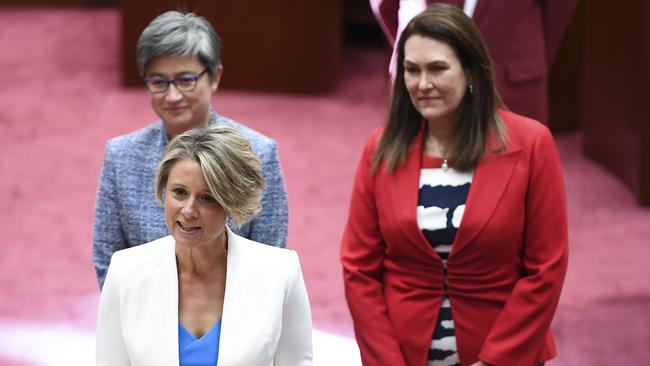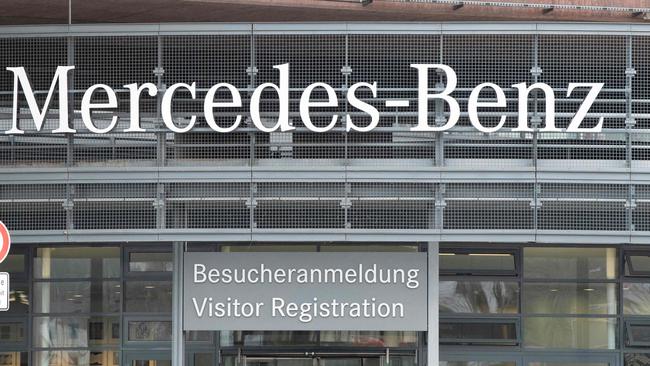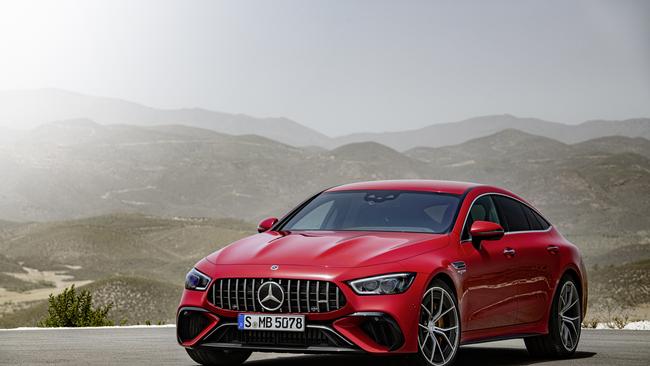Mercedes-Benz refutes ALP senator Deb O’Neill’s claim it misled a committee inquiry into the car industry
Mercedes-Benz has hit back at Labor senator Deb O’Neill’s claims it might have misled a parliamentary inquiry into the impact of its new car sales model in Australia.

Mercedes-Benz has hit back at accusations made by Labor senator Deborah O’Neill under parliamentary privilege that the car giant may have misled a Senate committee over changes to its business model, claiming evidence given by its executives was “truthful and accurate”.
The German car giant has argued its evidence before a powerful Senate inquiry late 2020 was “truthful” and provided “in good faith”, directly clashing with accusations its most senior executives could have lied to politicians when giving evidence.
In a letter sent by Mercedes-Benz Australia Pacific to the chair of the Education and Employment References Committee, Louise Pratt, and obtained by The Australian, the car giant refutes Senator O’Neill’s claims and strongly defends its own position as it changed the business model in Australia.
The simmering and prickly relationship between Mercedes-Benz and the Senator from NSW has now broken out into almost total war, with claims Mercedes-Benz could have lied to a Senate inquiry with Senator O’Neill using parliamentary privilege on Budget night on March 29 to make her inflammatory claims and the carmaker now firing back.
It builds on further tensions growing within the car sector as Mercedes-Benz in January switched to an agency model for its local car dealers which triggered a revolt by most of the dealerships and has now washed up in court where 38 incensed Mercedes-Benz dealers have launched a $650m court case against the car giant.
On Budget night, Senator O’Neill made a speech about Mercedes-Benz and the evidence of its key executives in November 2020 before a committee she was on that was looking into car manufacturers and dealers.
She argued that seven key assertions were made by Mercedes Benz Australia Pacific chief executive Horst von Sanden and director of network development Jason Nomikos that in combination supported their claims Mercedes-Benz car dealers were supportive of a new selling model to be introduced in 2022.
In the subsequent court case the car dealers released their statement of claim which Senator O’Neill believes conflicted with the carmakers’ evidence before the inquiry.
“I assert under the weight of current evidence that Mercedes-Benz appear to have misled the Senate committee. The detailed statement of claim from the Mercedes-Benz dealers in their current court action instead pours water on those seven claims,” she told the Senate.
In her speech, Senator O’Neill said the statement of claim revealed the car dealers were not happy with the proposed changes and in multiple meetings voted overwhelmingly not to proceed with the agency model, that Mercedes-Benz did not consult widely with dealers and the agency model is not a win for dealers.
“If instituted, the agency model will cut the profitability of some dealerships by over 50 per cent, and the experience, now that the model has been introduced, has sadly lived up to the dire predictions. The agency model is not about consumer benefits. It merely is about ensuring greater profits in Stuttgart instead of main streets in suburban and regional Australia,” she said.
Now Mercedes-Benz has hit back, firing off a letter defending the switch to its new business model and refuting Senator O’Neill’s accusation it misled a senate inquiry – which is a serious offence.
“Mercedes-Benz Australia/Pacific (MBAuP) appreciates the opportunity to undertake this review and address claims made by Senator Deborah O’Neill, under the protection of parliamentary privilege … that MBAuP representatives made inaccurate or misleading statements to the Inquiry,” the letter from new Mercedes-Benz Australia Pacific boss Florian Seidler and Mr Nomikos states.
“From the outset, we stand by our evidence as given by our then CEO and Managing Director Horst von Sanden and Director of Network Development and Customer Management Jason Nomikos, as well as our written submissions to the Inquiry.
“Our evidence was truthful, based on the information available at the time to MBAuP and provided to the Committee in good faith with the intention of furthering understanding of the MBAuP business, the evolution of luxury car sales and good policy and regulatory outcomes for our sector.”
The letter, dated May 6, claims that publicity stirred up by Senator O’Neill’s claims in parliament that it had been approached by a number of stakeholders for its response.
“So we can address our stakeholders’ queries openly and efficiently, we intend to share this letter with them. We trust you understand our position on this matter,” the letter to Labor Senator Pratt said.
The letter than proceeds to address the seven points raised by Senator O’Neill with Mercedes-Benz challenging and refuting each point as it relates to the new business model of selling its cars in Australia.
Under the new agency model which began this year, dealers will no longer purchase cars from Mercedes-Benz to resell to consumers. Instead, Mercedes-Benz will retain ownership of the vehicles, which the dealer will sell to the consumer for a fixed price – so no more haggling at the car yard – in exchange for a commission.
This has now formed the crux of the court dispute where 38 car dealers have taken Mercedes-Benz to court in a $650m claim and argue their businesses will be greatly damaged by the new model and that they weren’t properly consulted.

“MBAuP refutes any claim that it did not consult widely with dealers on the development of the agency model ahead of its introduction in January 2022,” Mercedes-Benz said in the letter to Senator Pratt.
“As the evidence of Mr von Sanden makes clear, the agency model was introduced in part after dealers first made requests in 2016 (and beyond) for support from MBAuP to manage market change and disruption. These challenges were evidenced, at the time, by the decline in profitability being experienced in Australia not only by Mercedes-Benz dealers, but across the entire sector.”
Mercedes-Benz also refutes claims by Senator O’Neill that some its car dealers would see their profitability drop by 50 per cent under the new agency model.
“We respectfully disagree with any characterisation that the agency model will “cut” the profitability of dealerships “by over 50 per cent.” We also do not agree with the claim the experience of the model has been “dire” for our retail network.
“While it has only been four months since the model was introduced, MBAuP has sold 8265 passenger vehicles and continues to lead competitors in the luxury car market year-to-date.”
Mercedes-Benz argues not all of its car dealers are litigants in the $650m court case, and in terms of scale and sales volumes, non-litigating car dealers account for almost half of passenger car sales for the period from January 1 – when the agency model was introduced – April 30.

Senator O’Neill said the agency model is not about consumer benefits. “It merely is about ensuring greater profits in Stuttgart instead of main streets in suburban and regional Australia. Dealer profits will be impacted. Deloitte analysis said that the profitability under the new model would decline by more than 50 per cent.”
Mercedes-Benz does not agree that dealer profits will be impacted by the agency model in the way contended.
“It is important to understand the final version of the agency model confers additional benefits to agents, including: harmonised commission, demonstrator vehicle ownership and a higher pre-delivery inspection payment,” Mercedes-Benz said in its letter.
“None of these significant benefits were built into the (Deloitte analysis) Tool in 2019 and were concessions provided by MBAuP to dealers before they signed agency agreements.
“As the evidence of Mr von Sanden made clear, Australia is an important market for Mercedes-Benz. The introduction of the agency model was intended to help grow our share of the local passenger car market by providing an exceptional sales experience to our customers and making it easier for our agents to sell passenger vehicles.”




To join the conversation, please log in. Don't have an account? Register
Join the conversation, you are commenting as Logout